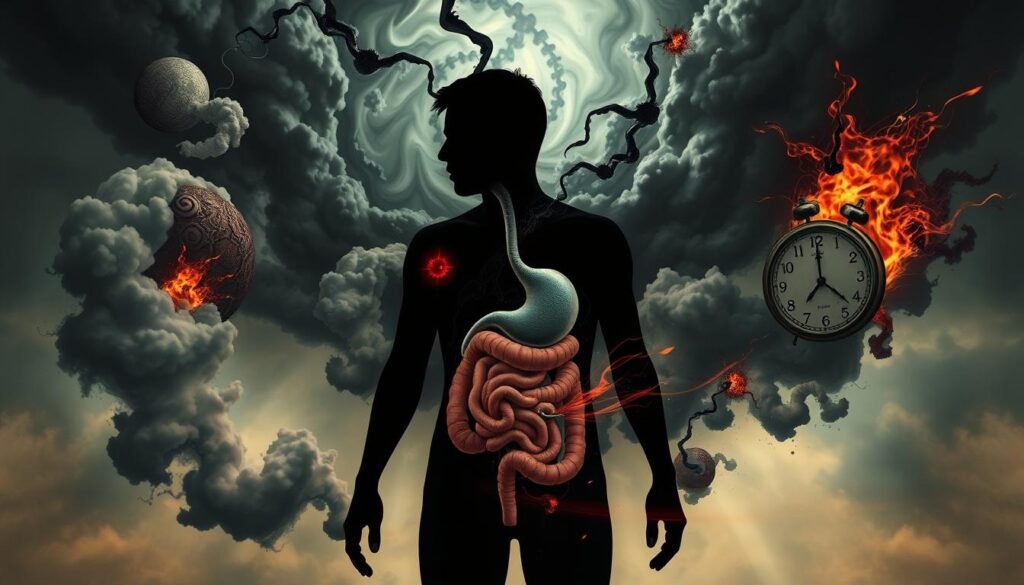Did you know around 60% of those with anxiety or depression also face chronic intestinal problems such as Irritable Bowel Syndrome (IBS)? This fact shows a big link between mental health and stomach issues. Many with anxiety disorders find themselves struggling with symptoms that lead to discomfort. This makes them wonder when to find medical help for these anxiety-related bowel issues.
It’s important to know how chronic stress affects our stomach health. If you often feel stomach pain, see changes in how often you go to the bathroom, or have other stomach troubles, you should think about seeing a doctor. When simple changes in your life don’t help your symptoms, seeing a specialist like a gastroenterologist is key. They can check your health and offer the right treatment. For more details on when to get help for stomach pain, look at this resource.
Noticing and knowing the symptoms is the first step to getting better. If your problems get worse, like seeing blood in your stool or losing a lot of weight, it’s crucial to get medical advice quickly.
Key Takeaways
- Approximately 60% of individuals with anxiety have gastrointestinal symptoms.
- IBS commonly coexists with anxiety disorders, creating a cycle of distress.
- Persistent symptoms lasting three months or more should prompt a medical evaluation.
- Serious signs like blood in stools or significant weight loss require immediate attention.
- Making lifestyle changes may help, but don’t hesitate to consult a professional if symptoms persist.
Understanding the Gut-Brain Connection
The gut-brain connection shows how our minds and stomachs talk to each other. This complex system uses pathways for communication between the brain and gut, affecting our well-being. Stress can mess with our digestion in many ways, causing discomfort and gut problems.
By understanding this link, we can better see how our feelings impact our body’s health.
How Stress Affects Digestive Health
Feeling stressed makes our bodies release certain hormones and neurotransmitters. These chemicals can mess up how our stomach moves, leading to nausea, bloating, or stomach pain. Studies have found that many with bowel problems also have more stress, anxiety, and depression.
This shows how closely our gut and brain work together, affecting each other.
The Role of the Enteric Nervous System
The enteric nervous system is like a second brain in our gut. It has over 500 million neurons and manages gut functions on its own but also talks to the central nervous system. The vagus nerve plays a key role in this communication, sending sensory and motor messages.
This amazing system is crucial for keeping our stomachs working right and managing anxiety. Gut microbes play a big part too. They make neurotransmitters that influence our brain and mood via our blood.
| Aspect | Description |
|---|---|
| Gut-brain Connection | Link between mental health and digestive function. |
| Stress Effects on Digestion | Disruptive hormones and neurotransmitters affect gut motility. |
| Enteric Nervous System | Complex neural network managing gut function independently. |
| Gut Microbes Role | Produce neurotransmitters that impact brain function. |
| Prevalence of Disorders | 30% to 40% of the population may experience functional bowel issues. |
Common Symptoms of Anxiety-Related Bowel Problems
Many people with anxiety-related bowel issues notice different stomach symptoms. Knowing these signs helps get the right help early, making life better. Being aware of how anxiety shows up physically is important for those dealing with these problems.
Identifying Gastrointestinal Distress
Stress or anxiety can make gastrointestinal distress worse. This includes:
- Bloating
- Abdominal pain
- Diarrhea
- Constipation
These symptoms can disrupt daily life. They might point to conditions like irritable bowel syndrome (IBS). Anxiety doesn’t directly cause these problems. But, they’re more common in anxious people.
Recognizing Bowel Irregularities
People with anxiety may also have bowel irregularities such as:
- Needing to go to the bathroom urgently
- Going to the bathroom more when stressed
- Changes in stool consistency or how often you go
Studies show a strong link between anxiety and these issues. About 60% of people with IBS also have a psychiatric disorder. This suggests anxiety plays a big role in bowel health. If you have these problems, talking to a doctor can help a lot. There are treatments for both mental and physical symptoms.
| Symptom | Associated Condition |
|---|---|
| Bloating | Generalized Anxiety Disorder |
| Diarrhea | Irritable Bowel Syndrome (IBS) |
| Constipation | Overall Anxiety Symptoms |
| Abdominal Pain | Stress-Related Disorders |
When to Seek Medical Help for Anxiety-Related Bowel Problems
Anxiety can lead to stomach troubles which might get worse if ignored. Knowing when to seek medical help is key to stay healthy. Look out for certain signs that suggest it’s time to see a doctor, to avoid serious problems.
Signs That Warrant Immediate Attention
It’s crucial to spot the signs requiring attention early. Important symptoms include:
- Blood in the stool
- Unexplained weight loss
- Persistent abdominal pain or swelling
- Severe changes in bowel habits
- Signs of anemia, like dizziness or feeling very tired
Getting help quickly for these symptoms is important. It ensures you get the right care. If you have these symptoms often, it could point to a bigger issue needing more check-ups.
Long-term Symptoms That Should Not Be Ignored
Paying attention to ongoing symptoms is essential. Don’t ignore ongoing discomfort or regular upset. These chronic symptoms can make anxiety worse, affecting your mental health and life quality.
Seeing a doctor can help understand these stomach issues and ease your worries. For more tips on handling anxiety-related stomach problems, click here.
The Connection Between Anxiety Disorders and Gastrointestinal Symptoms
Anxiety disorders and gastrointestinal symptoms often occur together. This is especially true for those with irritable bowel syndrome (IBS). Many people with IBS also face anxiety. This shows a strong link between the two conditions.
Knowing this connection helps in treating and managing them better.
What Research Shows About IBS and Anxiety
Research finds that 60% of people with IBS also have anxiety disorders. If someone has gastrointestinal issues, they’re more likely to have anxiety too. Issues include constipation, diarrhea, nausea, and cramps.
These can be connected to anxiety disorders like generalized anxiety and panic disorder. Headaches and fatigue are also common in those with anxiety. A study in gastrointestinal symptoms research shows those with anxiety may have more severe gastrointestinal problems.
Chronic Stress and its Impact on Gut Health
Long-term stress affects gut health. It can change how the gut works and impact the microbiome. This can make IBS symptoms worse.
People under lots of stress may see their digestive health decline. This can lead to more anxiety and digestive issues. Knowing how anxiety and IBS are linked highlights the importance of treating both.
Using stress management and changing your diet can help ease the symptoms. It’s vital to tackle both the mental and physical aspects.

Recognizing Symptoms of Irritable Bowel Syndrome (IBS)
Many people struggle with Irritable Bowel Syndrome (IBS). The link between IBS symptoms and emotions, like anxiety, is significant. Knowing the signs of IBS is crucial. It helps with self-awareness and prevents wrong diagnoses. IBS symptoms often get mixed up with other gut issues.
Key IBS Symptoms Linked to Anxiety
The main signs of IBS include:
- Cramping and abdominal pain
- Bloating and excessive gas
- Diarrhea or constipation, sometimes both
- Mucus in stools
- Urge to evacuate frequently
Stress or anxiety can make IBS symptoms worse. Those with anxiety disorders might feel these symptoms more. This creates a tough cycle of discomfort.
How IBS is Often Misdiagnosed
It’s easy to mistakenly diagnose IBS because its symptoms are like other gut issues. Signs such as unexplained weight loss or gastrointestinal bleeding require careful examination. Many who are anxious report gut problems, making diagnosis hard. This confusion can lead to incorrect treatment, not solving the real issue.
Chronic Stress and Its Effects on Digestion
Understanding how chronic stress affects digestion is key to managing gut issues. When we’re stressed for a long time, our body gets ready to fight or flee. This leads to big changes that mess up normal digestion. Knowing this helps us connect stress with digestive problems.
Understanding the Fight or Flight Response
The fight or flight response is what our body does when it feels threatened. It puts survival first, which means our digestion doesn’t get the resources it needs. This can make our heart beat faster and our muscles tighten, which isn’t good for our gut. Stress might not cause diseases like IBD directly, but it can make symptoms worse, including those of IBS.
How Stress Can Alter Gut Motility
Being under stress for too long can change how our gut moves, affecting how well it works. It can either speed up, causing diarrhea, or slow down, leading to constipation. This happens because stress messes with neurotransmitters in our gut. To calm down and get our digestion back to normal, activating the parasympathetic nervous system is helpful during stress.

Home Remedies and Self-Care Strategies
If you’re dealing with anxiety-related stomach issues, there are home remedies and self-care tips that can help. These steps can ease discomfort and make you feel better. Adding them to your daily routine can help manage GI symptoms and improve your mood.
Tips for Managing Anxiety-Related GI Symptoms
- Engage in regular exercise, aiming for 150 minutes of aerobic activity weekly, which can improve bowel function and alleviate constipation.
- Increase fiber intake by 2 to 3 grams daily, focusing on soluble fiber found in beans, oats, and fruits to help manage symptoms.
- Consider probiotics from sources like yogurt, kimchi, and sauerkraut to potentially ease IBS symptoms.
- Implement a low-FODMAP diet, avoiding high-FODMAP foods such as dairy, certain vegetables, and specific legumes that may trigger symptoms.
- Practice anxiety management strategies, incorporating methods such as cognitive-behavioral therapy to address underlying anxieties.
- Utilize peppermint oil, in enteric-coated capsules, to help reduce gas and abdominal discomfort.
Relaxation Techniques for Better Digestion
Relaxation methods are also key to improving digestion. Techniques like deep breathing and meditation calm your mind. This has a direct, positive impact on your digestive health. A study showed that a mindfulness class over 8 weeks improved GI symptoms in people with IBS. By focusing on relaxation, you can lower your stress and get healthier, both mentally and physically.
Medical Treatment Options for Anxiety-Related Bowel Problems
Anxiety-related bowel issues need a careful approach. Many treatments are there to help with digestive health and anxiety. Combining medications and therapy often works well.
Medications That Help Manage Symptoms
For those with anxiety and GI issues, some medications work really well. They include:
- Antidepressants: These might improve GI symptoms by dealing with the anxiety causing them.
- Anti-anxiety medications: These can lower anxiety, helping the digestive system get better.
- Gut-directed hypnotherapy: This therapy helps about 80% of IBS patients. It’s great when other treatments haven’t fully worked.
Therapy Options: Cognitive Behavioral Therapy and More
Therapy is key to treating anxiety-related bowel problems. Cognitive Behavioral Therapy (CBT) is very promising. It usually takes five to ten sessions to see big improvements. It helps patients change how they think about stress, impacting their digestive health.
The GI Behavioral Health Program offers help from psychologists trained for GI patient needs. Gastroenterologists suggest this when regular treatments fall short. Mixing therapy with medications for anxiety can really help symptoms and life quality.

| Treatment Type | Description | Effectiveness |
|---|---|---|
| Medications for Anxiety | Antidepressants or anti-anxiety drugs used to reduce GI symptoms | Effective in many cases |
| Cognitive Behavioral Therapy (CBT) | Psychological therapy focusing on reframing stress-related thoughts | Typically 5-10 sessions for optimal benefits |
| Gut-directed Hypnotherapy | Focused therapy with high success rates for IBS | About 80% response rate |
| Behavioral Interventions | Methods such as acupuncture and meditation to relieve symptoms | Proven to help with stress and anxiety |
Improving psychological health plays a big part in better digestive health, helping with issues like stomach pain. Those with anxiety and GI problems often do well with a mix of therapies. Exploring therapy for digestive health brings hope. Working with healthcare pros is key to best results.
Seeing a Doctor: What to Expect During the Consultation
Dealing with GI issues, especially those tied to anxiety, needs a deep understanding of your symptoms and possible root causes. It’s vital to talk about your symptoms clearly during a doctor’s visit. This helps the doctor diagnose and treat you correctly.
Preparing for Your Doctor’s Visit
Being prepared is key to getting the most out of your visit. Here are some steps to take before seeing your doctor:
- List symptoms: Write down all your symptoms, how often they happen, and how bad they are.
- Identify triggers: Keep track of anything that seems to make your symptoms worse.
- Review medical history: Be ready to talk about your past health issues and your family’s health history.
- Bring medications: Make a list of all the medicines you’re taking, including non-prescription drugs and supplements.
What Tests Might Be Conducted?
Doctors might do several tests to figure out what’s causing your digestive symptoms. These tests help exclude other possible conditions. Some common ones include:
| Test | Description |
|---|---|
| Blood tests | They look for signs of anemia, infection, or inflammation. |
| Stool tests | These check for infections, blood, or problems absorbing food. |
| Imaging studies | Tests like X-rays, ultrasounds, or CT scans show pictures of your digestive system. |
| Endoscopy | This test lets doctors see inside your digestive tract. |
Getting ready for your doctor visit properly can make the conversation more helpful. It also leads to better tests that find out what’s wrong with your digestive system.
Long-term Management of Anxiety and Digestive Health
Handling anxiety and digestive health well means taking a full-circle approach. This includes both your physical and mental health. It involves lifestyle changes and standard treatments to build a strong health foundation. This way, you can fight off anxiety and digestive issues better.
Integrative Approaches to Improve Mental Health
Integrative health looks at medicine, lifestyle, and mental support together. Activities like exercise can boost your mood and make you resilient. Using mindfulness techniques, such as meditation and yoga, helps manage stress. Also, having people to support you is key to mental wellness. This holistic approach can make understanding digestive health easier.
Diet and Lifestyle Changes That Support Gut Health
A good diet supports your gut over time. It should have high-fiber foods, lean proteins, and probiotics. Eating fruits, veggies, grains, and fermented items can also help. Keeping a food diary might show what triggers your IBS. Cut down on processed food and caffeine to ease anxiety and stomach issues. Seeing a health expert can personalize your diet plan.
| Dietary Focus | Benefits | Examples |
|---|---|---|
| High-Fiber Foods | Improves digestion and balances gut flora | Whole grains, fruits, vegetables |
| Probiotics | Enhances gut health and boosts mood | Yogurt, kefir, sauerkraut |
| Stress Reduction Techniques | May lower anxiety levels and improve GI function | Meditation, yoga, deep breathing exercises |
There’s a strong link between the mind and the gut. Often, those with GI issues also struggle with anxiety. So, it’s important to treat both. Health care pros can offer extra help for long-term care.
Blending these health methods and diet changes leads to better mental and gut health. This can improve your life significantly. For more info, check out resources like specialized studies. They explain how anxiety and the gut are connected.
Conclusion
Understanding how anxiety and bowel health affect each other is key to our well-being. Anxiety and bowel issues are closely linked and need thoughtful attention. Considering that about 11% of people worldwide have IBS, and many of these folks also feel anxious, it’s clear why knowing about gut health is important.
If you’re dealing with stomach issues from anxiety, getting medical advice quickly can really help. It’s important to notice symptoms that might require a doctor’s look. Using different approaches like therapy or changing what you eat can improve your digestive and mental health. By knowing about how these areas are connected, you can take better care of your mind and body. This highlights the need to include mental health care when treating anxiety-related stomach problems.